This year, the Interfraternity Council (IFC) made changes to the spring recruitment process and began enforcing pre-existing rules about recruiting in the fall, preventing fraternities from interacting with freshmen in the ways they typically had in the past.
The number of PNMs (Potential New Members) was at a recent low this year, with only 60 students registering for recruitment, according to the IFC.
“My framework when it comes to recruitment is that we always want to do better the next year. We were trying to create more structure within the formal recruitment process,” Assistant Director of Student Involvement Caro Douglas, who oversees the recruitment process, said.
IFC made the spring rush rounds more structured, increasing the time freshmen had to meet with fraternities during that week when compared to previous years. IFC President and Beta Theta Pi member Emerson Gray ‘24 says this new structure came after feedback from fraternity members about the process.
“Most of the changes happened because of the complaints of the chapters. We sat chapters down in IFC meetings and kept hearing them say ‘I don’t know the freshmen’ over and over again. That is why we tried to maximize the amount of time each chapter spends with the guys personally,” Gray said.
These changes included adding an orientation day at the beginning of the week that addressed dues, hazing and other relevant information, and allowed for more time for fraternity-freshmen interactions. This year, there were two days to meet with each fraternity, with freshmen getting 30 minutes with each rather than an hour for all five in a single day as in the past.
The invitation rounds during rush week were also altered. All fraternities were moved to the same location, the Watkins Room, and everyone was required to attend all rounds they were invited to. It was also possible for a PNM to accept all invitations they received instead of only two.
In addition, Bid Day was moved from Patrick Lecture Hall to the Cherrydale Alumni House, and freshmen were given more time to think about their decision once they knew which fraternities offered them a bid.
Gray says these changes resulted in benefits such as greater interpersonal connections during the process.
“I saw guys knowing names on every end. I saw chapter members remembering names and (PNMs) remembering names. The conversations were way more personal because of all the added time, and it was overall a much more personal rush,” Gray said.
He added that despite the low number of members who signed up for recruitment, fraternities saw the highest retention rate of any year at Furman, meaning that a record high number of people who started the recruitment process ended up in a fraternity.
“The rounds were a little bit long themselves, but the fact that only three people didn’t take bids is kind of crazy. That’s never happened. It’s normally more than that. And the fact that everyone who made it through got a bid, it’s also pretty unheard of,” IFC and Beta Theta Pi member Joseph Kosak ‘26 said.
However, many fraternity members reported that restrictions on recruiting in the fall contributed the most to difficulties recruiting new members.
This fall, the sole place for fraternity members to get together with PNMs prior to January was at IFC-sponsored events. In previous years, the rules for gathering with freshmen during the fall were less strict.
“I would say there is definitely nothing wrong with a more formal structured rush, but I wish there were more opportunities in the fall. I wish this freshman class had the same opportunities that I had in my first freshman year,” Sigma Chi member Patrick Guinee ‘26 said.
Pi Kappa Phi Recruitment Chair Cooper Pope ‘26 felt that the fall IFC-sponsored events, such as Meet the Greeks or the Chili Cook-Off, were not as effective at bringing freshmen into the rush process as fraternity events had been in the past.
“Most of the events IFC threw were not marketed well and just needed more awareness and info. These events had to be good too, because it was one of the only ways to meet freshmen,” Pope said.
Despite the challenges that have come with these changes, IFC remains committed to the concept of enforcing fall recruitment rules and holding a more structured formal rush. Douglas says this is part of a broader effort to center rush around what is best for incoming freshmen.
“From where I sit, my priority is the PNM. You are the future of this community, and I want you to have the best experience with recruitment because that is your first interaction with our community,” Douglas said. “If we are enhancing and bettering that first experience, we are showing what the standard is moving towards in the next four years.”
Douglas furthers that this philosophy works toward the goal of a more authentic experience.
“Across the nation, because of COVID, we’ve seen that students don’t have as many social skills as they would have. They often see recruitment as transactional. So it is not necessarily enhancing the structure of our recruitment, but actually just shifting the philosophy around recruitment. You should be getting to know men on an authentic level and try to know them as people and humans before recruiting,” Douglas said.
In addition to the changes to rush, IFC will implement a new system called the Furman Fraternity Excellence system, which will rate each chapter based on factors such as DEI, leadership and philanthropy.
“These rankings and all that info will be public on Furman’s website, which helps freshmen not feel lost. It’s all meant to encourage guys to rush because of what these organizations have to offer and feel comfortable doing so,” Gray said.
As members adapt to these changes, both formal rush and fall recruitment will continue to look different, but IFC members say that it may take time for everyone to adjust to the new system.
“The experience itself was hard, I think, for everybody. It was more akin to sorority rush than it was for rushing a fraternity, especially in the recent history of Furman – but the policies that we have aren’t going to change. I think it’s a good step in the right direction, this was just a transition year,” Kosak said.
Assistant News Editor Carter Ozburn contributed reporting to this article and is an associate member of Pi Kappa Phi.
This article has been updated to correct a misspelling of Emerson Gray’s name.





































